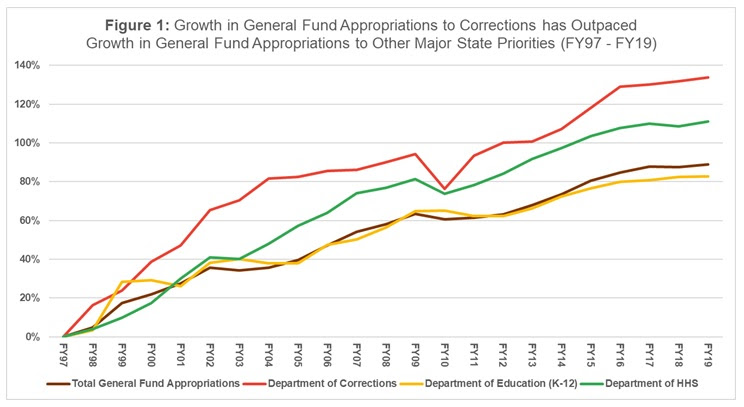The Appropriations Committee formulated a sound budget[1] that addresses funding for key state priorities. It also sets aside $134 million in projected revenue growth for new legislation for this year and $431 million total for new legislation through the next biennium (FY 23). How lawmakers choose to use this funding could have major ramifications for our state, particularly as we find ourselves facing a global pandemic.
Fiscal impact of major bills would leave state with a major deficit
Should lawmakers use $520 million to provide property tax relief by way of LB 1106, as some propose,[2] the state would be faced with a $90 million deficit by FY 23, assuming revenues meet projections.[3] Furthermore, should LB 1106 pass along with three other bills — LB 720, which would create a new tax incentive program; LB 1084, which would help fund a large project at the University of Nebraska Medical Center; and LB 153, which would exempt some military retirement income — the combined fiscal impact would be $626 million by FY 23, which would leave the state with a $195 million deficit. If they pass, these bills would reduce state revenues by 7% to 9% annually from FY 23 to FY 28.[4] The deficit could be compounded should other measures with fiscal impact also pass. Bills currently on second or final round of debate — including LB 720 and LB 153 — would have about a $60 million fiscal impact through FY 23.
Corrections funding a key discussion point in budget talks
While the budget doesn’t include funding to address overcrowding, the issue has been and will continue to be a key point during conversations around the budget. On July 1, Nebraska will have to issue a state of emergency if the population in our corrections facilities exceeds 140% of capacity.[5] If that happens, the state will have to reach 125% of capacity by releasing enough inmates over some undefined period of time.[6] The population of Nebraska’s corrections facilities is currently at 160% of design capacity.
Much of the discussion has and will likely focus on whether the situation can be addressed by sentencing reform or constructing new facilities, including a potential privately-built prison.[7] To help inform these discussions, we were asked to compare state funding for corrections with funding for other priorities over the past several years. (See Figure 1 below)
The past biennial budget reports available on the Nebraska Legislature’s website[8], dating back to FY97, show growth in state spending on corrections has outpaced growth in other major state funding areas and overall state budget growth. During this period, general fund appropriations to the Department of Corrections increased an average of 6.08% per year. In comparison, appropriations to the Department of Health and Human Services and the Department of Education grew by an annual average of 5.05% and 3.77%, respectively. The Nebraska state general fund budget grew at an annual average of 4.04% during this period. The growth in appropriations in this time period from all state fund sources — general, federal, cash, and revolving funds — tells a similar story.[9] Growth in appropriations for all fund sources averaged 5.95% annually for Corrections, 4.58% annually for HHS, 3.82% for K-12 education,[10] and 4.14% annually for the total state budget.
Assumptions regarding child welfare/HHS savings still questionable
The Appropriations Committee budget report includes savings of $6 million in FY20 and $27 million in FY21 and beyond. However, the report notes concerns about whether assumed long-term savings in child welfare will be fully realized. As mentioned on page 20 of the report, after the project bid was announced, the contractor selected to administer the child welfare program requested and was denied a $15 million increase in funding to comply with state statute.[11]
Cash reserve will be healthier but will it be strong enough to cover possible costs?
The committee’s budget projects that the cash reserve fund will have a balance of $731 million at the end of FY21 if revenue projections are realized. This would leave the cash reserve balance at 13.9% of general fund receipts, which is closer to the recommended level of 16% than it has been in recent years. An important question to consider is whether the cash reserve is strong enough to account for any coronavirus response funding that might be needed to shore up future budgets due to economic fallout from the virus. Likewise, lawmakers may need to consider whether additional dollars should be put in the Governor’s emergency fund for coronavirus response and possible 2020 flooding.
Conclusion
The Legislature came into the session charged with addressing several weighty issues including property tax relief, a new tax incentive program and corrections funding. The onset of the coronavirus pandemic has added an extraordinary level of uncertainty and complication to the legislative landscape and the state’s fiscal picture. It is simply impossible to know how the virus will impact Nebraska’s residents, communities and economy. This makes it vitally important that policymakers carefully consider the fiscal facts they do know to make the best policy choices they can. This will help ensure the health of our state and its residents as we move through this unprecedented time.
Download a printable PDF of this analysis.


